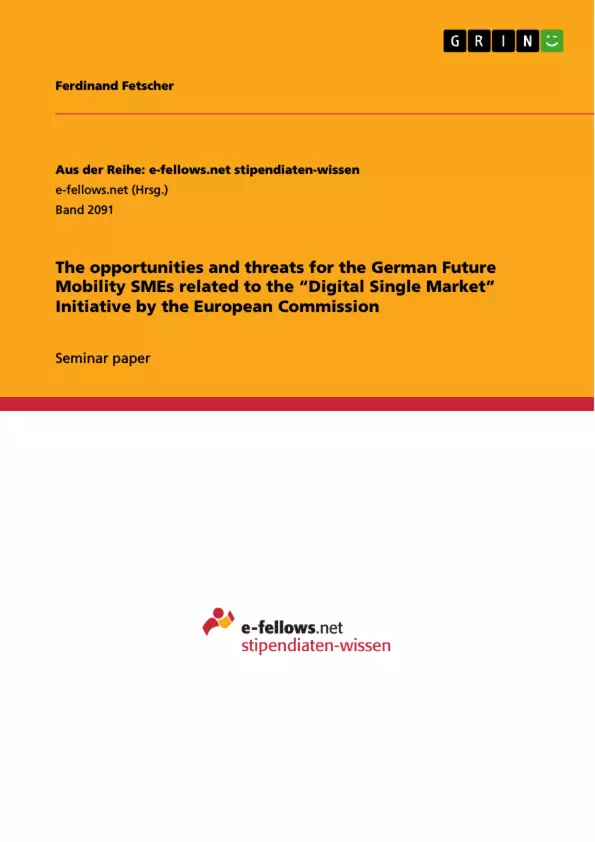On June 2nd 2016, transport service provider Uber attracted a record US$3.5 billion investment from Saudi Arabia's Public Investment Fund and reached a valuation of US$62.5 billion. The platform business is now worth more than German car manufacturer BMW, proving the enormous potential of innovation in the sector of future mobility. Uber and the other world´s leading digital platform businesses have a combined market capitalization of US$4 trillion, but only 4% of this value is generated by European firms. Incumbent businesses in the mobility sectors around the world are fighting with how to prosper in an increasingly digital and platform-based business environment, but European enterprises appear to be hampered due to the absence of a large, accessible digital market to support their growth.
Although the EU reached a high degree of economic integration, it is especially difficult for innovative start-ups, in sectors with a need for high initial investments, to scale their business up in Europe. Many highly innovative start-ups in this sector, therefore, move to the U.S. during their growth phase. Juncker´s Commission set-up a Single Digital Market Strategy in 2015 providing significant changes for the digital economy in Europe.
This paper outlines the German start-up scene in the sector of future mobility and analyzes their barriers for internationalization. As a conclusion, opportunities and threats related to the DSM Initiative will be derived.
Frequently asked questions
What is the document about?
The document is a language preview including a title, table of contents, objectives and key themes, chapter summaries, and keywords. It focuses on the challenges and opportunities for German SMEs in the future mobility sector concerning the Digital Single Market (DSM) initiative.
What topics are covered in the table of contents?
The table of contents includes sections on Introduction, Start-ups in the German future mobility sector, Start-up internationalization and the growth phase, Start-up's current barriers of internationalization in the EU internal market, The Digital Single Market Initiative, and Opportunities and threats for German SMEs in the future mobility sector related to the Digital Single Market Initiative.
What abbreviations are defined?
The list of abbreviations defines DSM (Digital Single Market), EC (European Commission), EP (European Parliament), EU (European Union), ICT (Information and Communications Technologies), SME (Small- and Medium Sized Business), VC (Venture Capital), and VDA (German Association of the Automotive Industry).
What is the main focus of the Introduction?
The introduction discusses the potential of innovation in the future mobility sector, highlighting Uber's significant investment and valuation. It also emphasizes the need for a large, accessible digital market in Europe to support the growth of European enterprises.
What does the section on "Start-ups in the German future mobility sector" cover?
This section discusses the drive for disruption in the automotive, mobility, and transportation sectors by innovative start-ups. It covers the convergence of hardware and software, as well as physical and digital solutions, and the increasing importance of technology-oriented start-ups. It presents the two examples of start-ups to conclude practical implications: Electric Mobility Concepts UG (eMio) and UNU Motors.
What internationalization strategies are mobility start-ups pursuing?
The section on Start-up internationalization covers market selection and market entry mode decisions. It mentions possible ways of entrance into international markets including direct and indirect exports, non-equity contractual modes, equity-based models, external factors influencing the internationalization decision.
What are the current barriers to internationalization for start-ups in the EU internal market?
The document identifies barriers such as protectionism, trade restrictions, lack of venture capital, different national regulations on consumer protection, high cost of cross-border delivery and high cost of European VAT.
What is the Digital Single Market (DSM) Initiative?
The DSM aims to create a European Single Market where citizens and businesses can seamlessly and fairly access online goods and services, regardless of their nationality or location. It aims to stimulate competition and trade, improve efficiency, raise quality, and cut prices.
What does the document say about the opportunities and threats of DSM initiative?
The author summarizes the opportunities and threats related to the Digital Single Market Initiative for start-ups in the future mobility sector, suggesting it encourages innovation and entrepreneurship.
What appendices are included in the document?
The appendices include information on Barriers related to the business environment for the enterprises in EU-EEA markets and non-EU-EEA markets, The automotive revenue pool, Mobility sector faces increasing innovation and disruption, and Degree of internationalization among innovative European Start-ups.
- Citar trabajo
- Ferdinand Fetscher (Autor), 2016, The opportunities and threats for the German Future Mobility SMEs related to the “Digital Single Market” Initiative by the European Commission, Múnich, GRIN Verlag, https://www.grin.com/document/338402



